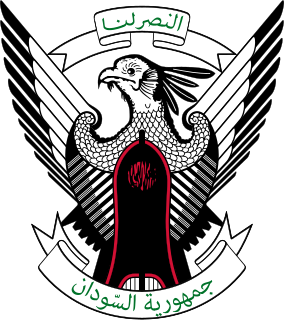
Officially, the politics of Sudan takes place in the framework of a presidential representative democratic consociationalist republic, where the President of Sudan is head of state, head of government and commander-in-chief of the Sudanese Armed Forces in a multi-party system. Legislative power is vested in both the government and in the two chambers, the National Assembly (lower) and the Council of States (upper), of the bicameral National Legislature. The judiciary is independent and obtained by the Constitutional Court. However, following a deadly civil war and the still ongoing genocide in Darfur, Sudan was widely recognized as a totalitarian state where all effective political power was held by President Omar al-Bashir and the National Congress Party (NCP). However, al-Bashir and the NCP were ousted in a military coup which occurred on April 11, 2019. The government of Sudan is now led by the "Transitional Military Council".
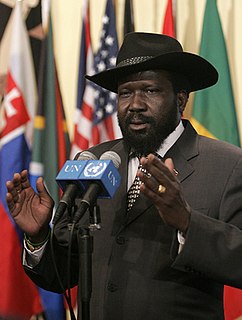
Salva Kiir Mayardit is a South Sudanese politician who has been President of South Sudan since its independence in 2011. He is a Dinka and prior to independence, he was President of the Government of Southern Sudan, as well as First Vice President of Sudan, from 2005 to 2011.
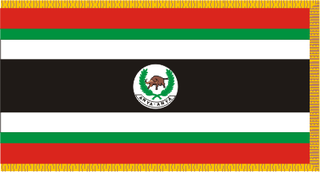
The Anyanya were a southern Sudanese separatist rebel army formed during the First Sudanese Civil War (1955–1972). A separate movement that rose during the Second Sudanese Civil War were, in turn, called Anyanya II. Anyanya means "snake venom" in the Madi language.

Riek Machar Teny Dhurgon is a South Sudanese politician who served as the inaugural Vice President of South Sudan, from its independence in 2011 until his dismissal in 2013. Between April and July 2016 Machar served as the First Vice President of South Sudan. He now leads the rebel faction opposing Salva Kiir known as SPLM-IO.

The Sudan People's Liberation Army (SPLA) is the army of the Republic of South Sudan. The SPLA was founded as a guerrilla movement against the government of Sudan in 1983 and was a key participant of the Second Sudanese Civil War. Throughout the war, it was led by John Garang.
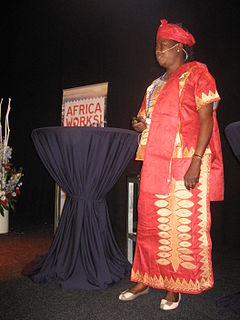
Betty Achan Ogwaro is a parliamentarian in the government of Southern Sudan (GOSS).

Malik Agar is a Sudanese politician and insurgent leader active in the insurgency in Blue Nile state.

The Sudanese conflict in South Kordofan and Blue Nile, also referred to by some media as the Third Sudanese Civil War, is an ongoing armed conflict in the Sudanese southern states of South Kordofan and Blue Nile between the Sudanese Army (SAF) and Sudan People's Liberation Movement-North (SPLM-N), a northern affiliate of the Sudan People's Liberation Movement (SPLM) in South Sudan. After some years of relative calm following the 2005 agreement which ended the second Sudanese civil war between the Sudanese government and SPLM rebels, fighting broke out again in the lead-up to South Sudan independence on 9 July 2011, starting in South Kordofan on 5 June and spreading to the neighboring Blue Nile state in September. SPLM-N, splitting from newly-independent SPLM, took up arms against the inclusion of the two southern states in Sudan with no popular consultation and against the lack of democratic elections. The conflict is intertwined with the War in Darfur, since in November 2011 SPLM-N established a loose alliance with Darfuri rebels, called Sudan Revolutionary Front (SRF).
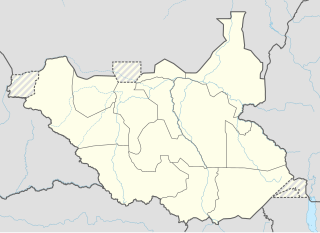
Lafon County is an administrative area in Imatong State of South Sudan Before the reorganisation of states in 2015, it was a county of Eastern Equatoria. The largest town is Lafon.
Peter Lorot is a former officer who served with the Sudan People's Liberation Army (SPLA) during the Second Sudanese Civil War (1983-2005). He broke away from the SPLA in 1999 with a Didinga force based on Chukudum, in Budi County of Eastern Equatoria State in South Sudan. In the resulting conflict many people were displaced. As of April 2011 Lorot's forces were still not reconciled with the de facto SPLM government.
Louis Lobong Lojore is a former Brigadier General in the Sudan People's Liberation Army (SPLA) who was elected Governor of Eastern Equatoria State in South Sudan, taking office in May 2010.

Kapoeta South County is an administrative region in Namorunyang State. Before reorganisation of states in 2015, it was a part of Eastern Equatoria state of South Sudan, with headquarters in Kapoeta town. The county logo is a ram with horns and slightly bent tail. The county includes the Kapoeta Town, Machi and Namorunyang Payams.
The Government of Eastern Equatoria from 2005 to 2010 took office in Eastern Equatoria State of South Sudan after a peace treaty was signed between the Sudan People's Liberation Movement and the government of Sudan based in Khartoum. Elections were originally planned for 2009, but were postponed until April 2010.
The government of Eastern Equatoria from 2010 took office in Eastern Equatoria State of South Sudan on June 2010 following nationwide elections in April 2010. On 9 June 2010 the Governor, Brigadier General Louis Lobong Lojore, named his ministers and the County Commissioners. Nartisio Loluke Manir was appointed Deputy Governor.
Jemma Nunu Kumba is a South Sudanese politician.
George Echom Ekeno is a politician who was deputy governor of Eastern Equatoria state in South Sudan, and was later appointed state minister for Environment, Wildlife Conservation & Tourism.

The South Sudan Air Force (SSAF), also previously known as the Sudan People's Air Force or Sudan People's Liberation Air Force, is the air force of the South Sudan People's Defense Forces (SSPDF) of South Sudan. The headquarters are located in Juba Air Base, Juba.

The South Sudanese Civil War is an ongoing conflict in South Sudan between forces of the government and opposition forces. In December 2013, President Kiir accused his former deputy Riek Machar and ten others of attempting a coup d'état. Machar denied trying to start a coup and fled to lead the SPLM – in opposition (SPLM-IO). Fighting broke out between the Sudan People's Liberation Movement (SPLM) and SPLM-IO, igniting the civil war. Ugandan troops were deployed to fight alongside the South Sudanese government. The United Nations has peacekeepers in the country as part of the United Nations Mission in South Sudan (UNMISS). In January 2014 the first ceasefire agreement was reached. Fighting continued and would be followed by several more ceasefire agreements. Negotiations were mediated by "IGAD +". A peace agreement known as the "Compromise Peace Agreement" was signed in August 2015. Machar returned to Juba in 2016 and was appointed vice president. Following a second breakout of fighting within Juba, the SPLM-IO fled to the surrounding and previously peaceful Equatoria region. Kiir replaced Machar as First Vice President with Taban Deng Gai, splitting the opposition, and rebel in-fighting has become of major part of the conflict. Rivalry among Dinka factions led by the President and Paul Malong Awan have also led to fighting. In August 2018, another power sharing agreement came into effect.

The Sudanese gubernatorial elections took place on 11–15 April 2010, alongside the wider Sudanese general election, to elect the Governors of the states of Sudan.

Heavy armed clashes have been ongoing in Wau State since late June 2016, between the Dinka-dominated Sudan People's Liberation Army (SPLA) and local opposition forces, consisting of tribal Fertit militias as well as fighters claiming allegiance to Riek Machar. It is unclear to what extent these rebels are actually part of the SPLM-IO or acting independently while using the SPLM-IO's name. So far, the clashes resulted in the arrest of the state's governor, Elias Waya Nyipuoc, widespread death and destruction in the state capital, Wau town, and the displacement of up to 150,000 people.














